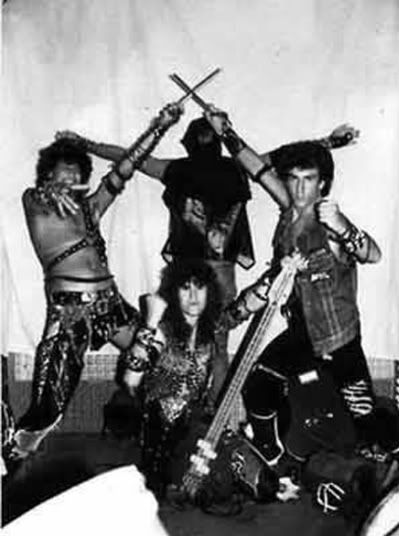
Back in March, when we were trying to get some stories together for the VICE Brazil Issue, I thought a feature on Brazil's golden age of metal would make an interesting feature. I contacted every legendary 80s Brazilian black/death/thrash band I could think of, with a view to some interviews. I got email addresses from the official sites, went through their official MySpaces, and even emailed a university in Belo Horizonte, as Sarcófago's Wagner Lamounier is a professor of economic science there. But it was all for shit. Either they didn't speak English, didn't get the email, or thought I was a waste of time. One dark hero, Vulcano's Zhema Rodero, did finally respond though, and I got as far as sending him a list of questions (back in April), but he disappeared again and never replied. Until last night.
AFITFOG: Firstly, I'm interested in finding out Vulcano's origins. How did you guys all meet?
Zhema Rodero: Like all the bands rising (at the time), I studied in the same school together with Paulo Magrão (Vulcano's original guitarist) and we played some rock songs on guitar. Around '78/'79 we formed Astharot, and some years after, Vulcano. In the beginning we played a raw hard rock style, trying to do something like Motörhead, but our singer and equipment just weren't good enough to do that. In '84, the vocalist Angel joined the band, so we became more dirty and brutal with our Brazilian heavy metal.
How were you guys received by the Brazilian media and public?
In '83 we released our first record, a 7" single, and we were totally underground – nobody knew about us. In those times there were big Brazilian rock bands belonging to the massive record companies. Vulcano were a little band. In the end of 1983, a famous Brazilian reporter wrote a review about us in the Brazilian Dictionary of Rock, so Vulcano became more well known in the scene.
When you released Bloody Vengeance, it was pretty unique for its time. What were you guys influenced by?
I do not know exactly, but I venture to say that it was a combination of factors, between the style of play of Lauder (drummer), Flavio (guitarist), and my compositions. I have my way of writing songs, which is well embedded in the style of them.
Was there a big scene in Brazil in the mid '80s or was it underground? Were you, MX, Mutilator, Sarcófago, and Sepultura all friends?
Yeah! There was a strong scene here in Brazil, even though we were all underground. We were all friends because we were always playing together or watching other bands play festivals. Most bands of that time never did anything outside of Brazil. There are few who had a small reputation, Vulcano were one.
How did you feel about what happened to thrash metal towards the end of the '80s/early '90s?
I know that was a very important moment for the metal. Today, the metal is a style and will live forever in the history of music in the world. I’m proud to have participated at that time.
What did you make of the Norwegian black metal scene that hailed all those Brazilian bands as massive influences?
It's hard to explain, because when the Brazilian scene was born, the social politics imposed by government was very different. Here in Brazil we revolted against that situation so it was one of the reasons why we put more rage in our songs.
Where do you see the sound going from now?
I think the sound of Vulcano will become anachronistic because I don't like to put modern elements into the music that I do. I do a song primarily to please myself and I am an old guy, so my song will sound old. I would like to finish by saying that Vulcano are finishing their newest album and it's called Five Skulls And One Chalice. We are doing the mix, and if all goes well Cogumelo Records will release it next November.
Thank you for the opportunity to answer these interesting questions and keep banging !!!!!!!!
Indeed we shall and thank you Zhema.
1 comment:
Thanks a lot, this is excellent... and way better than Sarcofago's I.N.R.I.
Post a Comment